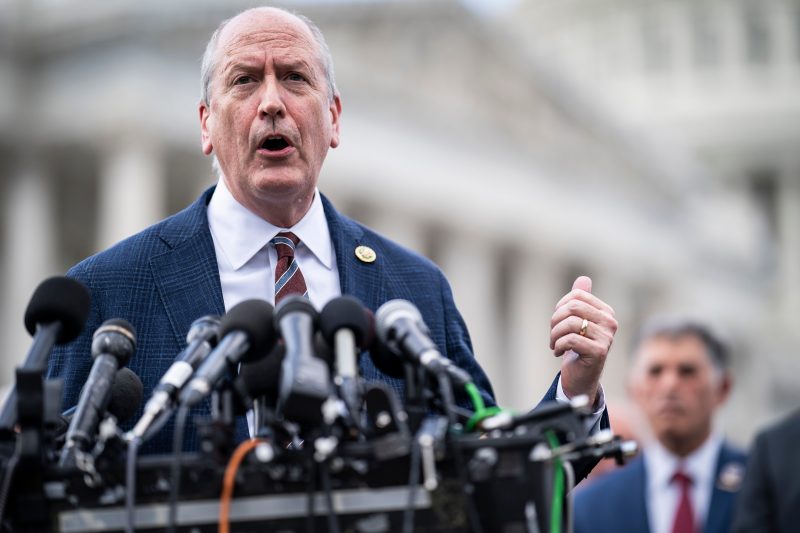Adam Brandon, president of the conservative group FreedomWorks, stepped up to a microphone outside of the Capitol on Tuesday.
“The single greatest threat to the United States is not China, it’s not AI. It’s our debt,” he began. He cited the current level of federal debt and how it was projected to increase. “What’s really ironic to me,” he then continued, “is a lot of these folks back here” — he pointed to the members of the right-wing House Freedom Caucus standing behind him, like Rep. Lauren Boebert (R-Colo.) standing over his right shoulder — “I’d say a lot of millennial voters aren’t exactly supporting them, right? They tend to vote more left?”
“This is the only group in town that’s actually defending the millennial interests!” he continued. “They’re standing here for future generations that don’t even support them! That’s crazy!”
Boebert smiled. Touché!
The problem, of course, was that the rest of the news conference made very obvious why many young voters aren’t enthusiastic about members of the caucus and their politics. Ostensibly pegged to government spending, a parade of legislators and right-wing activists mostly just used federal spending as a peg for other complaints about what President Biden and “the government” were doing — things that resonate with Fox News viewers, not young voters.
In that sense, it was fitting that one of the speakers at the news conference was tea party-celebrity Jenny Beth Martin. The tea party movement formalized the way in which complaints about spending serve as a proxy for culture-war and other right-wing issues. The tea party’s power on the right collapsed once Donald Trump came along and simply engaged in the culture-war, fringe stuff directly. When spending soared during his administration, there were very few complaints on the right.
House Speaker Kevin McCarthy’s (R-Calif.) announcement elsewhere on Capitol Hill that he was endorsing an impeachment inquiry against President Biden meant that the most heavily covered moment in the Freedom Caucus news conference came when Rep. Scott Perry (R-Pa.) excoriated a reporter who asked what evidence existed to warrant the probe.
“Oh, I don’t know,” he replied sarcastically. “We have the bank accounts, we can see — you can see that the homes the Bidens own can’t be afforded on a congressional or Senate salary. You also understand that it’s not normal for family members to receive millions of dollars from overseas interests. Those things aren’t normal. It’s not normal to have 20 shell companies.”
And so on. Worth noting: Perry, who was intimately involved in the effort to help Donald Trump retain power after losing the 2020 election, had not expressed similar concerns about Trump-family shell companies and income. Also worth noting: the house thing — the only one actually linked to the president — has previously been addressed.
This exchange, the culmination of the news conference, encapsulated the event. Talk about the debt served as a gateway into talking about other, more blood-boiling issues. Government spending is too high, speakers argued … because of “woke deficit spending” or because federal law enforcement was targeting Biden’s political enemies. Sens. Rick Scott (R-Fla.) and Mike Lee (R-Utah) showed up to complain about spending, but they were interspersed with fringe-right representatives offering up clips that might earn a few seconds on Fox News. How can we allow so much spending … when the government is trying to tell you what stove to buy?!?! That sort of thing.
“We have an opportunity to save our country or lose it,” Rep. Clay Higgins (R-La.) said, framing the entire discussion in typically apocalyptic terms. Shortly after, he introduced right-wing activist Tom Fitton, whose insights into government spending are somewhat less numerous than his ability to reiterate rhetoric from the right-wing media.
“Are we going to continue to fund, Republicans in the House, the wild abuse by the Biden administration of its political opponents?” Fitton said. “The mass censorship of tens of millions of Americans? The border invasion we’ve heard so much about and the other wild abuses of power that are right now fully funded with Congress?”
Sure, strike the “mass censorship” line item from the appropriate department’s funding resolution. We can all support that.
It’s a cudgel. It’s using spending bills as a means of talking about these other issues. It’s the old tea party trick: I am simply against how much the government is spending … on programs that I object to because they are woke.
Brandon of FreedomWorks was at least focused in his objections. That young (and younger) Americans don’t see the federal debt as a preeminent concern, though, shouldn’t be a surprise even independently of Tuesday’s context. Concerns about the scale of the debt have been a regular feature of political discourse since millennials were kids. And before that. A few years ago I pored over newspaper archives and found that as far back as 1940, Thomas Dewey was expressing concern about the debt load on America’s grandchildren run up by “long-haired theorists.”
So, seeing debt as a less-than-existential threat, millennial and other voters are left to observe the other political stands that the Freedom Caucus et al are espousing. And, it seems, many aren’t convinced that Boebert, Perry and Higgins are their best advocates.

